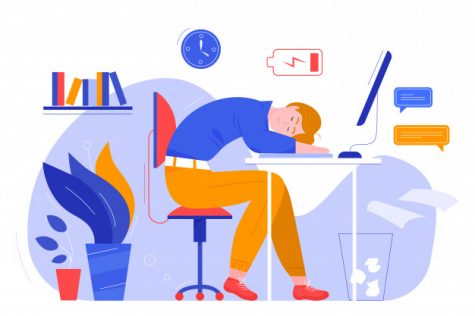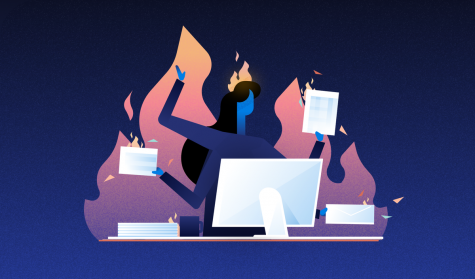Burnout: What is it and Ways to Counter it
Burnout is a state of exhaustion, stemming from causes such as feeling overwhelmed and prolonged stress. It can occur in several different settings, from the workplace to school to family. Anyone can find themselves face-to-face with burnout. When in such situations, however, it’s important to be aware and know how to counter it.
 There are a total of five stages of burnout, as outlined by Winona State University. It starts at stage one, where everything is perfect, called the “Honeymoon” stage. However, if someone in the honeymoon stage cannot properly cope with stress, one will eventually have to leave the Honeymoon stage. From there, the following stages contain a series of effects, ranging from fatigue or exhaustion to trouble sleeping, which get increasingly worse and longer with higher stages, ending at stage five in which burnout is embedded in a student’s life. Stage Two is the “Balance Act” stage, in which one is aware that some days, handling stress is easier than other days. Signs of being in the balance act include job dissatisfaction, work inefficiency, fatigue, trouble sleeping, and repeatedly doing an escapist activity. Stage three is the “Chronic Symptoms” stage, with effects including chronic exhaustion, physical illness, and anger and depression. Stage four is the “Crisis” stage, with intensifying physical symptoms, obsessing about work frustrations, an overwhelming pessimism and self-doubt, and an “escapist mentality.” Finally, at stage five, the burnout symptoms are embedded in your life, meaning you’re more likely to be “labeled as having some significant physical or emotional problem than you are to be called a burnout case.” Recognizing early signs of burnout is therefore critical, especially since burnout can accumulate into something worse over time.
There are a total of five stages of burnout, as outlined by Winona State University. It starts at stage one, where everything is perfect, called the “Honeymoon” stage. However, if someone in the honeymoon stage cannot properly cope with stress, one will eventually have to leave the Honeymoon stage. From there, the following stages contain a series of effects, ranging from fatigue or exhaustion to trouble sleeping, which get increasingly worse and longer with higher stages, ending at stage five in which burnout is embedded in a student’s life. Stage Two is the “Balance Act” stage, in which one is aware that some days, handling stress is easier than other days. Signs of being in the balance act include job dissatisfaction, work inefficiency, fatigue, trouble sleeping, and repeatedly doing an escapist activity. Stage three is the “Chronic Symptoms” stage, with effects including chronic exhaustion, physical illness, and anger and depression. Stage four is the “Crisis” stage, with intensifying physical symptoms, obsessing about work frustrations, an overwhelming pessimism and self-doubt, and an “escapist mentality.” Finally, at stage five, the burnout symptoms are embedded in your life, meaning you’re more likely to be “labeled as having some significant physical or emotional problem than you are to be called a burnout case.” Recognizing early signs of burnout is therefore critical, especially since burnout can accumulate into something worse over time.
 As a result of burnout, one might grow to dislike their trade. In turn, this would cause an individual’s performance to deteriorate. Not only could the outcome of their work deteriorate, but one’s attitude might change, making them less tolerant towards their colleagues. In effect, burnout can lead to more mood swings and a change in temper, and it may damage important relationships.
As a result of burnout, one might grow to dislike their trade. In turn, this would cause an individual’s performance to deteriorate. Not only could the outcome of their work deteriorate, but one’s attitude might change, making them less tolerant towards their colleagues. In effect, burnout can lead to more mood swings and a change in temper, and it may damage important relationships.
There are several ways to address burnout. Perhaps, one of the best strategies is to simply exercise. While with the pandemic, many might lose their daily exercise of walking around campus, it’s still very useful to schedule out some time to just exercise, even if it’s something as simple as just taking your dog on a walk.
Next, practicing good sleeping habits is also important. With the pandemic, our computers might be at hand almost 24/7, and the effects of the blue light could put us to sleep. Yes, by no means do balancing the online option of school with ensuring limited computer interaction to maximize sleep go hand in hand; some might even argue that they contradict each other. Therefore, for this, it’s nice to enable different modes meant for late-night working and then sleeping near the best time.
Sources:
- https://www.winona.edu/stress/bntstages.htm
- https://www.healthline.com/health/tips-for-identifying-and-preventing-burnout
- https://www.ncbi.nlm.nih.gov/books/NBK279286/

Shreya Chaudhary is a senior planning to major in data science or computer science. She interns with TigerGraph, promotes and tutors women in STEM through...

